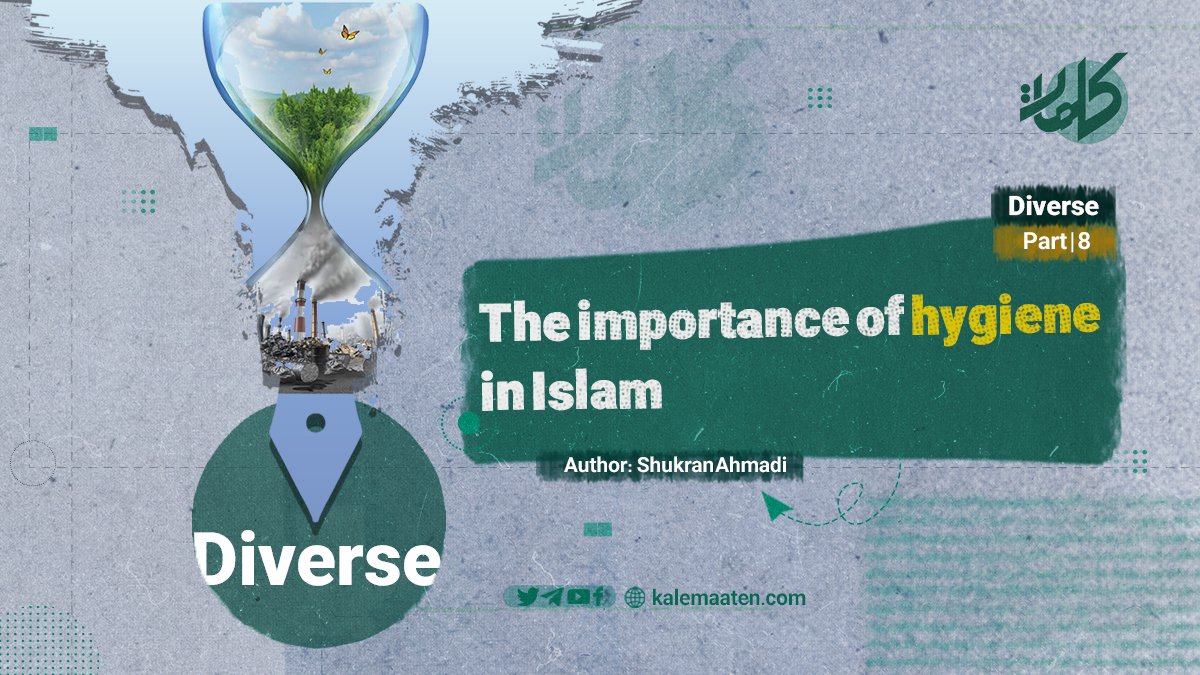Author: Shukran Ahmadi
The Importance of Hygiene in Islam (Part 8)
Ghusl (Ablution) Rulings
One of the fundamental cleanliness and sanitary orders in Islam is taking ablution after sexual intercourse. This ablution is very beneficial for the body and its health and has many advantages. When a person engages in sexual intercourse and ejaculates, all the pores of the body and hair are opened. It is mentioned in a narration from the Holy Prophet, may Allah bless him and grant him peace, that there is dirt in the stem of the hair. If it remains and the pores are open, it can be harmful to the body; therefore, after each occurrence of sexual intercourse, it is best and cleanest to perform ablution.
Abu Rafeh, the servant of the Prophet, may Allah bless him and grant him peace, said: “The Messenger of Allah, may Allah bless him and grant him peace, came to all his wives in one night and performed ablution in each home of his wives. I said, ‘O Messenger of Allah, may Allah bless him and grant him peace, would it be wrong for you to perform ablution just once?’ The Prophet, may Allah bless him and grant him peace, replied: ‘This is purer and cleaner.'”
The benefits of Ghusl (ablution) after sexual intercourse include:
-
Excitement and invigoration of the soul.
-
Replacement of what was lost during intercourse.
-
Perfection of purity and cleanliness.
-
The gathering of instinctive heat in the body after its release during intercourse.
-
Allah (S.W.T) satisfaction.
-
Maintaining the health and fitness of body parts.
Etiquette of Sexual Intercourse in Islam
-
After digesting food.
-
In a balanced temperament of the body, while the body is neither too hot nor too cold, nor suffering from conditions such as severe constipation, high humidity, extreme hunger, or a full stomach. The harm of intercourse when the stomach is full is not less than the harm of intercourse when the body is very hungry. Additionally, when there is excessive moisture in the body, the harm is not less than when the body is constipated, and when the temperature is high, the harm is not less than when the temperature is cold.
The peak time for lust and interest is during erection and full release (without pretense and without continuous thinking or looking). Late at night, after digesting food and taking a bath or performing ablution, is the recommended time for sexual intercourse.
Stimulating or forcing intimacy with older women or immature girls who are not competent to engage in intercourse can weaken the sexual instinct and be harmful to the body. The age compatibility of husband and wife is very effective and useful in this regard. Avoid intercourse when tired, immediately after taking a bath, after vomiting, or during mental inactivity such as sadness and calamity.
Lewat (Buggery)
Buggery is a heinous act and is forbidden in heavenly religions, especially Islam. It is certainly harmful, unhygienic, and can lead to various incurable diseases, as has been well established by medical professionals today.
Buggery was not allowed during the time of any prophet. The Holy Prophet, may Allah bless him and grant him peace, said: “Cursed is the one who approaches a woman through buggery.” He also stated: “Indeed, Allah is not shy from telling the truth; do not approach women through buggery.”
The Losses of Buggery
-
Opposing and disobeying Allah’s order, which invites Allah’s wrath and curse.
-
Ruining a woman’s right [her right to intercourse via the vagina].
-
Elimination of generation.
-
Intercourse in a place other than the vulva will not absorb semen and will fail to drain the tube, which is harmful for the man, unlike the vagina, which is absorbent and drains properly.
-
It is a filthy place.
-
Hatred and disgust from women.
-
Sadness.
-
It darkens the face and chest, destroying the light of the heart, with its effects evident on the face.
-
Loss of modesty.
-
An inclination towards ugliness.
-
Humiliation and frustration.



